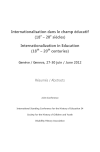 |
Szerző: | Kéri Katalin |
| Cím: | Western influences and national characteristics of the 18th century Hungarian women education literature | |
| Megjelenés: | Internationalization in education (18th – 20th centuries) International Standing Conference for the History of Education 34 (ISCHE), Society for the History of Children and Youth & Disability History Association, 27-30 juin 2012 Geneva, Abstract Book, p. 125. | Licenc: | © Kéri Katalin 2012 | Hungary 2.5 [CC BY-NC-ND 2.5] |
| Letöltés: | [.pdf] [.rtf] [.txt] [stream] [.epub] [.mobi] [.djvu] | |
| Identifier: | Internet Archive |
The presentation gives an overview of the influence of the western european countries’ works and discussions in the 18th century Hungary and Transylvania, supporting cultural rights and education of women, written then and earlier. In Hungary during the Enlightnement movement, a number of works were published affecting female education, women’s educational needs and opportunities. Although their number has fallen far short of the French, English or German works of the era, analysis shows that their meanings and intellect did not differ from the writings of the western areas. This was not only due to the “spirit of the age”, but also to those influences that became part of the Hungarian educational perspective, which influences originated from western european books that became rather known in Central and Eastern Europe as well. Even a small number of the remaining sources prove that among the Hungarian authors there were some, both Catholic and protestant, who showed a predisposition toward the problems of women education. Of these, several writers were acquainted with the Spanish, French, English and German ideas of their predecessors and contemporaries, such as Vives, Fénelon, Halifax, Nettesheim, Campe and others. Their works on women and female education are often reflected in the sources of the 18th century Hungarian education, and in many cases one will also encounter partial or complete translations of these. Our research focuses on the exploration, interpretation and analysis of the the Hungarian resources and on comparing the content of the text to foreign works. Among others we also looked at Letters from Turkey, the work of Kelemen Mikes (who was exiled together with Prince Ferenc Rakoczi the second), from which Fenelon’s and Madame de Maintenon’s impact is clearly discernable through texts from 1719 and 1725. We analyzed the writer and bodyguard of the Habsburg court in Vienna, Gyorgy Bessenyei’s work Maternal education, published in 1777, which is a transcription of Marquess of Halifax’s work The Lady’s New-Year’s Gift, or Adice to a Daugther, published in 1688. We also studied the Jesuit, Ferenc Faludy’s work, written in 1748 addressing the women. The preview of this work was Darell’s book, A supplement to the first part of the Gentleman instructed with a word to the ladies published in 1708. The Hungarian translations of foreign authors’ work about women education enjoyed special attention. For instance, such a transplantation was made by the Hungarian priest Istvan Nagy Szerencsi about the German Andreas Meyer’s work in 1783, as well as by Samuel Andradi about the German Campe’s work, Väterlicher Rat für meine Töchter. Putting in an international context those Hungarian works about women and women education that were published in the age of Enlightenment, and studying them based on a gender approach helped in understanding and clarifying what kind of intermediary channels, and through which subjects and works the European ideas were obtained in Hungary concerning the subject. Using content analysis and comparative studies we were also able to obtain a more accurate picture of the typically and characteristically Hungarian ideas and issues about female education, derived from Hungary’s social and national development. The presentation gives a summary of these effects and interactions in the history of women’s education in the 18th century, and of both the internationalism of thoughts as well as their national characteristics.